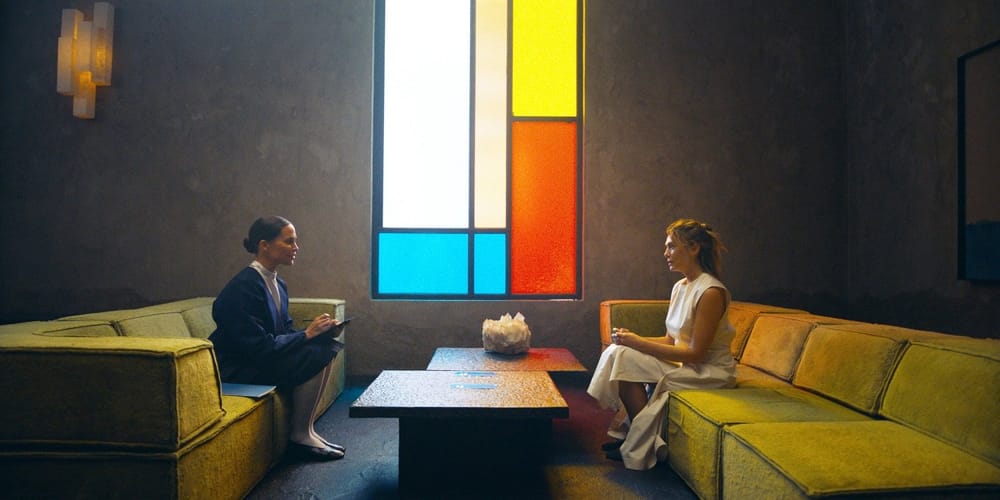In a world overwhelmed by climate change, where resources grow scarcer and humanity has long ago abandoned the open skies, The Assessment dares to ask the question: What does it mean to bring life into a broken world? Directed by debut filmmaker Fleur Fortuné, this thought-provoking dystopian thriller explores the haunting, often devastating reality of parenthood when the future seems so uncertain and so precarious. It is a film that does not shy away from the deepest anxieties of our time, balancing them with an elegant and emotionally complex portrayal of love, fear, and the need for connection.
Set in a future where the Earth is on the brink of collapse, The Assessment paints a haunting picture of a society trapped within a protective dome, separated from the “Old World” ravaged by extreme weather and the remnants of humanity’s reckless choices. It is a world where procreation has been banned to ensure the survival of what little is left, with reproduction only allowed under strict government regulation. To have a child, one must undergo a rigorous seven-day evaluation—a test to determine if they are worthy of bringing a new life into a dying world.
At the heart of The Assessment are Mia (Elizabeth Olsen) and Aaryan (Himesh Patel), a couple who seem on paper to be the ideal candidates for parenthood. Mia, a botanist, has spent her life nurturing the remnants of nature that survive within the dome, while Aaryan, a computer scientist, works tirelessly on the frontier of technology, seeking to recreate the life-like simulations of a world that no longer exists. Their life together is simple and quiet, a beautiful but fragile bubble of love and longing. Yet, this serenity is shattered when Virginia (Alicia Vikander), the government-appointed assessor, arrives to put them through the emotional and psychological wringer.
Virginia’s role is both intriguing and terrifying. She is a symbol of the state’s cold, calculating authority, yet her own behavior quickly becomes a blur of unsettling contradictions. One moment, she presents herself as a strict enforcer of the rules; the next, she adopts the persona of a child, turning what should be a professional evaluation into a series of increasingly bizarre and deeply uncomfortable tests. Her behavior is both disorienting and chilling, and Vikander plays the role with an intensity that is both mesmerizing and unnerving. She slides effortlessly between the rigid, almost robotic authority of a government agent and the unpredictable, childlike wonder of someone who may not entirely understand her own role in this system. It is a performance that is equal parts disturbing and captivating.
Fortuné’s direction is equally arresting. As a former music video director, she brings a distinct visual style to the film that is at once haunting and mesmerizing. The world of The Assessment feels both alien and strangely familiar, a place where the past is constantly lingering just beneath the surface. The design of Mia and Aaryan’s home is a striking mixture of sterile modernity and the faded echoes of a bygone era. The starkness of the environment, with its clean lines and minimalistic design, heightens the sense of isolation and entrapment, reinforcing the claustrophobic nature of the world Fortuné has crafted. Yet, within this austere setting, there are glimpses of warmth—small moments where life still clings to the edges of this broken world.
The true brilliance of The Assessment lies in its ability to juxtapose the personal and the political. While the stakes of the narrative revolve around the fate of one couple and their dream of parenthood, the film never loses sight of the larger questions it is asking: What does it mean to be a parent in a world on the brink of collapse? What choices must one make when the future feels uncertain, and when the state controls every aspect of reproductive choice? Fortuné never lets the viewer forget that Mia and Aaryan’s test is not just about their fitness to be parents—it is about the larger societal forces that have shaped and controlled their lives, and the ways in which those forces will continue to dictate the course of humanity’s future.
In this respect, the performances of Olsen and Patel are nothing short of extraordinary. Olsen brings a quiet tenderness to Mia, a woman who has always found solace in nurturing life, whether it be the plants she cares for or the relationship she has built with Aaryan. Her performance is a study in restraint, with every glance and gesture carrying the weight of her character’s internal struggle. Patel, too, is exceptional as Aaryan, a man caught between his desire for a family and his intellectual obsession with the artificial recreations of life. The chemistry between the two is palpable, their bond one of deep affection and unspoken tension. As their relationship is tested by the absurd and invasive trials set before them, their performances shift and evolve, capturing the emotional turmoil of being faced with the impossible choices that the world around them demands.
Though The Assessment builds toward a heartbreaking conclusion, its final act falters slightly, revealing too much where ambiguity would have been more powerful. By tying up loose ends, it diminishes the weight of its emotional and philosophical questions. Yet the film lingers like an unshakable whisper in the dark—a choice unresolved, a question unanswered. It offers no comfort, only the haunting inquiry: In a world teetering on the edge, is hope enough, or is bringing new life into uncertainty the most defiant act of belief?
Director: Fleur Fortuné
Cast: Elizabeth Olsen, Himesh Patel, Alicia Vikander
Writers: Nell Garfath Cox, Dave Thomas, John Donnelly
Producers: Julie Goldstein, Grant S. Johnson, Elizabeth Karlsen, Jonas Katzenstein, Maximilian Leo, Shivani Rawat, Stephen Woolley
Music: Emilie Levienaise-Farrouch
Cinematography: Magnus Nordenhof Jønck
Editor: Yorgos Lamprinos
Streaming Availability:

